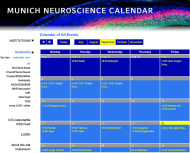PhD student in Sensory and Behavioral Neuroscience
In the lab of Ilona Grunwald Kadow, TUM School of Life Sciences, Munich
21.03.2019
PhD student position for highly-motivated individual with a background in neurobiology or related fields, ideally some experience in programming and data analysis, and a desire to develop cutting-edge experimental techniques. Very good comprehension of English is mandatory; knowledge of German is not a requirement.
The aim of the research in the lab is to understand the cellular and neural mechanisms of internal state and context-specific behavior. Why do animals perceive the same sensory information differently due to a change in their physiological state or current situation? How do different individuals experience the same situation? To tackle these questions, we primarily use Drosophila genetics in combination with innovative behavioral analysis, in vivo functional imaging, and state-of-the-art neural circuit mapping techniques. We further aim at achieving a circuit-based understanding of neural processing by combining experimental data with computational modelling.
The project goal is to unravel how changes in reproductive state influence the female brain and female choice behavior in the long-term. To this end, we have identified several circuit motifs in the fly’s brain poised to undergo long-lasting synaptic plasticity upon mating. You will characterize how reproductive state induces plasticity and long-term change in certain synapses and which signals from the body are used to relay reproductive state and the experience of mating. The successful applicant is expected to spend the first 4-5 months of their PhD in a collaborating laboratory in Cambridge, UK, to trace neural connections using the recently published adult brain connectome.
References:
Grunwald Kadow, Current Opinion Neuro 2019; Sayin et al., Frontiers in Cell Neurosc, 2018; Hussein, Zhang et al., PLoSBiology 2016; Hussein, Ucpunar et al., PLoSBiology 2016.
Application
Applicants will be considered until the position is filled.
For further information please visit: http://www.neuro.wzw.tum.de or email ilona.grunwald@tum.de
To apply, please email the following to: neuro@wzw.tum.de (ref. GGK application)
1. A curriculum vitae
2. A letter of motivation explaining your scientific interests, your strengths when working on a problem, why us etc.
3. Contact details for 2 referees
4. A written sample of scientific research, e.g. a manuscript, thesis, or code etc.





